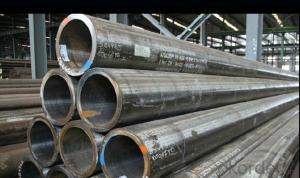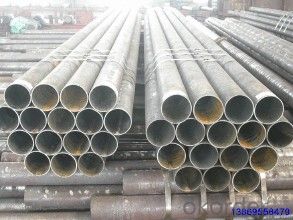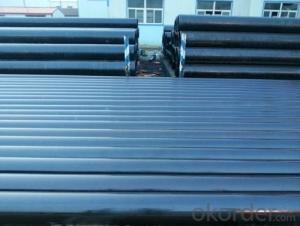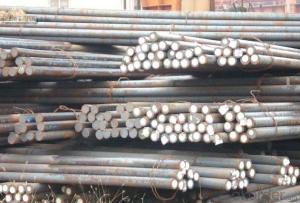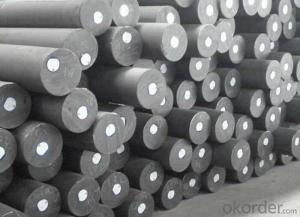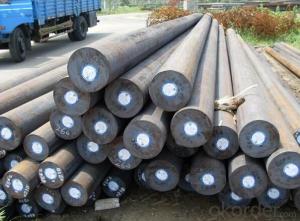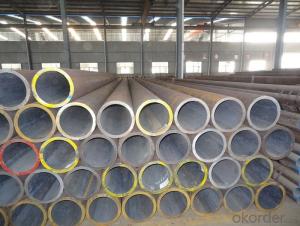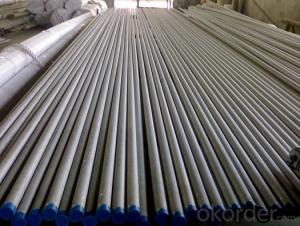ASTM A335 P91 High Alloy Steel Tube
- Loading Port:
- China Main Port
- Payment Terms:
- TT or LC
- Min Order Qty:
- 25-35 m.t.
- Supply Capability:
- -
OKorder Service Pledge
OKorder Financial Service
You Might Also Like
Quick Details
| Thickness: | 1.5 - 70 mm | Section Shape: | Round | Outer Diameter: | 0.125 - 20 inch |
| Place of Origin: | Shandong China (Mainland) | Secondary Or Not: | Non-secondary | Application: | Hydraulic Pipe |
| Technique: | Hot Rolled | Certification: | SGS/BV/IBS | Surface Treatment: | Oiled |
| Special Pipe: | Thick Wall Pipe | Alloy Or Not: | Is Alloy | Length: | Random length or fixed length |
| Grade: | 10#,20#,15CrMo,12Cr1MoV,12CrMo,16Mn,A179-C,A213,A210,A335 P12,A178-C,A199,St35.8,St37-2,Q235,10#-45#,Cr-Mo alloy,A53-A369,ST35-ST52,Q195-Q345 | Standard: | JIS G3445-2006,JIS G3446-2004,GB/T 8163-1999,GB/T 8162-1999,GB 5130,DIN 1629/3,DIN 2391,DIN 17175,DIN 2448,ASTM A106-2006,ASTM A213-2001,ASTM A53-2007,ASTM A210-1996,ASTM A335-2006,ASTM A179-1990,JIS,GB,DIN,ASTM |
Packaging & Delivery
| Packaging Detail: | Standard seaworthy packing,or as per customer's request. |
| Delivery Detail: | In 7-30days |
Specifications
high temperature A335 P91 alloy steel tube:
1. MOQ:10MT
2. OD:1/8"-20"
3. Standard:ASTM,DIN,JIS,GB
4. Fast delivey
high temperature seamless A335 P91 alloy steel tube:
Standard | ASTM, BS, JIS, DIN |
Steel Grade | ASTM A210-C,A333,A334,A335,P11,P5,P9,P91,A209 T1,SAE4130/JIS G3455,G3464,G3460,G3462,G3458/DIN st52,st35N/ BS3059.3T53,GB 16Mn,12CrMo,35CrMo |
O.D. | 1/8"-20" |
W.T. | SCH10-XXS |
Length | 5m-12m |
Outside Coating | Black painting, anti-corrosion oil, galvanized or as per required by customers |
Packing | Wrapped in bundles by steel strips/bulk |
Carbon steel seamless pipe price | USD950-USD1800/Ton |
Third party inspection | SGS/BV |
Production Capacity | 400,000tons per year |
Delivery time | 20 days |
Main market | Asia, India, Middle East, America, Europe |
High Alloy Steel Tube Image
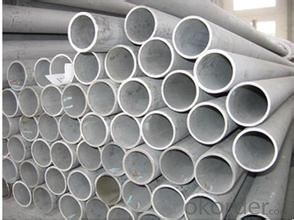
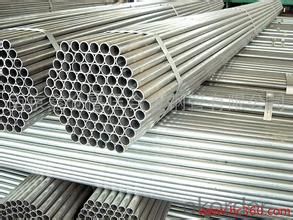
FAQ of High Alloy Steel Tube
①How is the quality of your products?
Our products are manufactured strictly according to national and internaional standard, and we take a test
on every pipe before delivered out. If you want see our quality certifications and all kinds of testing report, please just ask us for it.
Guaranteed: If products’ quality don’t accord to discription as we give or the promise before you place order, we promise 100% refund.
②How about price?
Yes, we are factory and be able to give you lowest price below market one, and we have a policy that “ for saving time and absolutely honest business attitude, we quote as lowest as possible for any customer, and discount can be given according to quantity”,if you like bargain and factory price is not low enough as you think, just don’t waste your time.Please trust the quotation we would give you, it is professional one.
③Why should you chose us?
Chose happens because of quality, then price, We can give you both.Additionally, we can also offer professional products inquiry, products knowledge train(for agents), smooth goods delivery, exellent customer solution proposals.Our service formula: good quality+good price+good service=customer’s trust
SGS test is available, customer inspection before shipping is welcome, third party inspection is no problem.
Any question, pls feel free to contact us !
- Q: How do you calculate the pipe thermal expansion for steel pipes?
- In order to calculate the thermal expansion of steel pipes, one must take into account the material's coefficient of thermal expansion (CTE), the temperature fluctuation, and the pipe's length. The CTE represents the extent to which a material expands or contracts in response to temperature changes. For steel, the average CTE is typically approximately 12 x 10^-6 per degree Fahrenheit (or 6.5 x 10^-6 per degree Celsius). However, this value may vary depending on the specific grade of steel. Subsequently, the temperature change that the pipe will encounter must be determined. This can be the discrepancy between the operating temperature and the ambient temperature, or the temperature variation caused by the fluid or gas flowing through the pipe. Finally, the thermal expansion can be calculated using the following formula: Thermal Expansion = CTE x Length x Temperature Change Where: - CTE signifies the coefficient of thermal expansion - Length denotes the pipe's length - Temperature Change represents the temperature difference For instance, if a steel pipe has a length of 10 meters (32.8 feet) and experiences a temperature change of 100 degrees Celsius (180 degrees Fahrenheit), assuming a CTE of 12 x 10^-6 per degree Celsius, the thermal expansion would amount to: Thermal Expansion = 12 x 10^-6 x 10 x 100 = 0.012 meters (or 12 millimeters) This means that the pipe would expand by 12 millimeters due to the temperature alteration. It is important to note that this calculation provides an approximation of the thermal expansion. However, other factors such as pipe supports, restraints, and the specific application should also be taken into consideration to ensure the proper design and installation of the steel pipe system.
- Q: How are steel pipes protected against external corrosion in coastal areas?
- Steel pipes in coastal areas are protected against external corrosion through various methods. One commonly used method is the application of protective coatings, such as epoxy or polyethylene, which act as a barrier between the steel surface and the corrosive elements in the coastal environment. Additionally, cathodic protection techniques, such as sacrificial anode systems or impressed current systems, are employed to prevent corrosion by providing a protective current to the steel pipes. Regular inspection and maintenance of these protective measures also play a crucial role in ensuring the long-term corrosion protection of steel pipes in coastal areas.
- Q: How are steel pipes protected against lightning strikes?
- Steel pipes are protected against lightning strikes by installing lightning rods or grounding systems near the pipes. These systems provide a path of least resistance for lightning to follow, diverting the electrical current away from the pipes and minimizing the risk of damage or explosions.
- Q: How are steel pipes used in the automotive industry?
- Steel pipes are commonly used in the automotive industry for various applications such as exhaust systems, fuel lines, and structural components. They provide strength, durability, and resistance to corrosion, making them ideal for withstanding high temperatures and harsh conditions. Steel pipes are essential in ensuring efficient exhaust gas flow, delivering fuel to the engine, and providing structural support to enhance vehicle safety and performance.
- Q: Are steel pipes suitable for structural applications?
- Yes, steel pipes are suitable for structural applications. Steel pipes are known for their strength, durability, and versatility, making them ideal for various structural applications. They can be used in buildings, bridges, stadiums, and other structures to provide support and stability. Steel pipes have high tensile strength, which allows them to withstand heavy loads and resist deformation under pressure. Additionally, their resistance to corrosion makes them a reliable choice for structural applications, even in harsh environments. The use of steel pipes in structural applications is further enhanced by their cost-effectiveness and easy installation. Overall, steel pipes are a popular choice in the construction industry due to their strength, durability, versatility, and cost-effectiveness.
- Q: How are steel pipes used in data centers?
- Steel pipes are used in data centers for the purpose of housing and protecting the intricate network of cables and wires that transmit data. These pipes create a structured pathway for the cables, ensuring that they are organized, secure, and easily accessible for maintenance and upgrades. By using steel pipes, data centers can optimize their cable management, enhance airflow, and maintain a clean and organized environment for efficient data transmission and storage.
- Q: What are the common factors affecting the flow capacity of steel pipes?
- There are several common factors that can affect the flow capacity of steel pipes. 1. Pipe Diameter: The diameter of the pipe is one of the most significant factors affecting flow capacity. The larger the diameter, the greater the flow capacity as there is more area for the fluid to pass through. 2. Pipe Length: The length of the pipe also plays a role in flow capacity. Longer pipes generally have higher frictional losses, which can reduce the flow capacity. 3. Surface Roughness: The internal surface roughness of the steel pipe can impact flow capacity. Rough surfaces create more friction, which can reduce the flow rate. Smooth pipes, on the other hand, allow for smoother flow and higher flow capacity. 4. Fluid Properties: The properties of the fluid being transported through the steel pipe can affect flow capacity. Factors such as viscosity, temperature, and density can impact the flow rate. For example, highly viscous fluids will have lower flow capacity compared to less viscous fluids. 5. Pressure Drop: Pressure drop along the length of the pipe is another factor that affects flow capacity. As fluid flows through the pipe, there may be pressure losses due to friction, bends, or restrictions. Higher pressure drops result in lower flow capacity. 6. Pipe Material and Wall Thickness: The material of the steel pipe and its wall thickness can influence flow capacity. Different materials have different properties that can affect flow rates. Additionally, thicker walls can reduce the internal diameter of the pipe, resulting in lower flow capacity. 7. Pipe Layout and Fittings: The design and layout of the pipe system, including the presence of fittings such as valves, elbows, and tees, can impact flow capacity. These fittings can cause additional pressure drops and turbulence, reducing the overall flow rate. It is important to consider these factors when designing or evaluating a steel pipe system to ensure optimal flow capacity and efficiency.
- Q: How are steel pipes connected or joined together?
- Steel pipes are typically connected or joined together using various methods such as welding, threading, flanges, or couplings.
- Q: Can steel pipes be used for underground water treatment systems?
- Yes, steel pipes can be used for underground water treatment systems. Steel pipes are known for their durability, strength, and resistance to corrosion, making them suitable for various applications, including underground water treatment systems. They can withstand the pressure and environmental conditions found underground, ensuring the safe and efficient transport of water within the treatment system. However, it is important to consider the water quality and potential for corrosion in the specific location when selecting the type of steel and implementing protective measures, such as coatings or cathodic protection, to prevent corrosion and ensure the longevity of the pipes.
- Q: Can steel pipes be used in the automotive industry?
- Yes, steel pipes can be used in the automotive industry. They are commonly used for various applications such as exhaust systems, fuel lines, and structural components due to their strength, durability, and resistance to heat and corrosion.
Send your message to us
ASTM A335 P91 High Alloy Steel Tube
- Loading Port:
- China Main Port
- Payment Terms:
- TT or LC
- Min Order Qty:
- 25-35 m.t.
- Supply Capability:
- -
OKorder Service Pledge
OKorder Financial Service
Similar products
Hot products
Hot Searches
Related keywords
